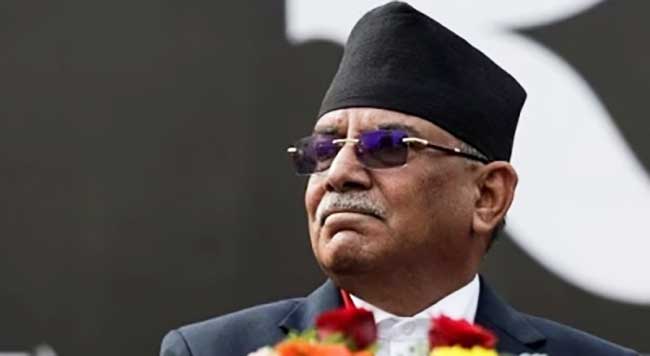A long-term energy deal between Nepal and India, to be signed during the upcoming visit of India's External Affairs Minister S. Jaishankar, will be a milestone, said Prime Minister Pushpa Kamal Dahal 'Prachanda'.
During Dahal's India visit in May-June, the two countries agreed to sign a long-term power agreement where India would import 10,000 megawatts from Nepal in ten years. However, the formal agreement could not be signed at that time.
Now, both the countries have formalized the long-term inter-government power trade agreement, which is expected to be signed during Jaishankar's visit to Nepal.
"Soon, we are going to sign the long-term energy deal with India," Dahal said on Friday while inaugurating the second largest electricity substation whose purpose is to export electricity to India.
The mid-term and long-term energy trading deal between Nepal and India will be signed in Kathmandu. For this, senior Indian officials are also arriving in Kathmandu, the Prime Minister added.
The 25-year long-term agreement was initiated when Dahal visited India between May 31 and June 3.
India's Prime Minister Narendra Modi had announced during a joint press meet with Dahal that the southern neighbour would buy 10,000 MW of electricity in 10 years from Nepal under the long-term power trade agreement.
"During my India visit, we have laid a good foundation for energy trade between Nepal and India. To materialize the long-term power trade which was agreed between Nepal and India and to use the abundant water resources of Nepal in a practical sense, we are going to make a special announcement in Kathmandu," said Dahal, whose government is battling due to poor governance, service delivery, recession in the economy, poor governance among others.
Dahal inaugurated the electricity substation which was largely built by Indian consultants and Indian construction companies and is largely instrumental in exporting energy from Nepal and India from the eastern part.
He also shared that Nepal has earned over Rs 15 billion (nearly 10 billion Indian rupees) while trading spill energy with India in the last year. After formalizing the agreement in writing, this will ensure India is the primary energy market of Nepal and in the first phase, Nepal will export 10,000 megawatts of energy to India. The agreement will be valid for another 25 years following the day of signing of the agreement.
Besides exporting power to India, there is a sharp increase in Indian investment in Nepal’s energy sector. India's SJVN Limited, which is developing the 900 MW Arun-3 Hydropower Project, has also been granted a license to develop the 669 MW Lower Arun Hydropower Project and the 490 MW Arun-4.
Arun-4 will be developed as a joint venture by the NEA and SJVN, which will have a majority stake.
Likewise, India's NHPC Limited is also set to develop the 750 MW West Seti and the 450 MW Seti River-6 project. Similarly, NHPC Limited and Vidyut Utpadan Company Limited signed a memorandum of understanding to jointly develop the 480 MW Phukot Karnali Project during Dahal’s India visit. Indian firm GMR is also making efforts to develop the 900 MW Upper Karnali Hydropower Project.




New Urban Community Health Centre to reduce patients rush in GBP Hospital: CM Dr Manik Saha
Chief Minister Dr Manik Saha on Thursday laid foundation stone of 50-bed Urban Community Health Center here at Agartala and said that the present government is working diligently to improve health infrastructure and services in the state.
Govt determined to develop sports infrastructure in Tripura: CM Dr Manik Saha
Chief Minister Dr Manik Saha on Thursday inaugurated football turf, athletics track and hockey ground here at Agartala Dasarath Deb Sports Complex at Badharghat and said that the government is determined to develop facilities and platform for sports persons in the state.
Mistake that benefits no one: World leaders react to Trump's 'reciprocal tariffs'
As US President Donald Trump signed an executive order on the so-called "reciprocal tariffs," the world reacted sharply against the decision, with some calling it a "mistake that benefits no one" while others called it a violation of Washington's obligations under the World Trade Organization (WTO).
Indian pharmaceutical exports get reprieve from Trump’s reciprocal tariffs
Because of the importance of India’s pharmaceuticals to US healthcare, those exports will get a reprieve from President Donald Trump’s reciprocal tariffs, according to the White House.
India stands less impacted by Trump tariffs than global peers: Industry
As US President Donald Trump announced reciprocal tariffs on dozens of countries, including India, industry experts said on Thursday that it appears India's export competitiveness to the US market stands far less impacted on a relative basis compared to global peers.
IAF pilot killed, another critical as Jaguar fighter jet crashes in Gujarat
An Indian Air Force (IAF) pilot lost his life, while another sustained critical injuries after their two-seater Jaguar fighter jet crashed near Gujarat's Jamnagar Airfield, the IAF confirmed on Thursday.
PM Modi emplanes for Thailand; to attend BIMSTEC summit
Prime Minister Narendra Modi on Thursday emplaned for Thailand on a state visit to attend the 6th BIMSTEC Summit, with his visit also set to bolster bilateral relations between New Delhi and Bangkok.
Bhavan’s Little Learners celebrate annual programme
The Bhavan’s Little Learners, Bordowali celebrated annual programme and organised prize distribution ceremony here at Agartala Rabindra Satabarshiki Bhavan on Wednesday.